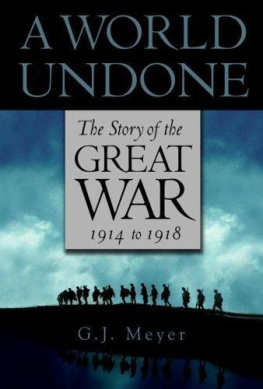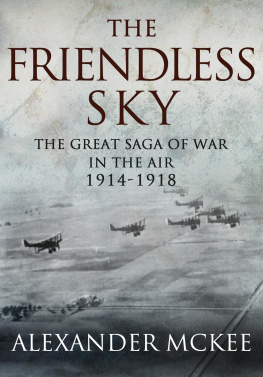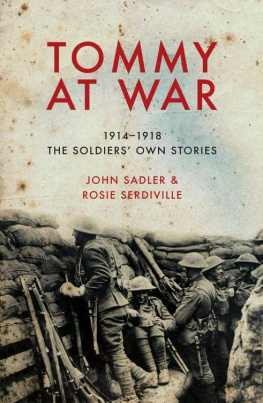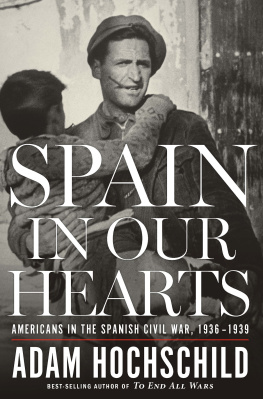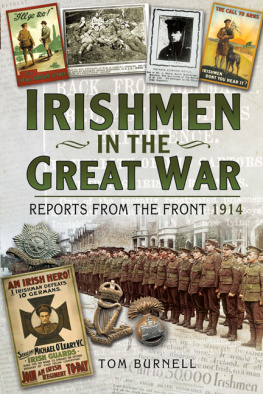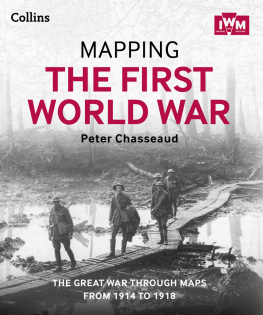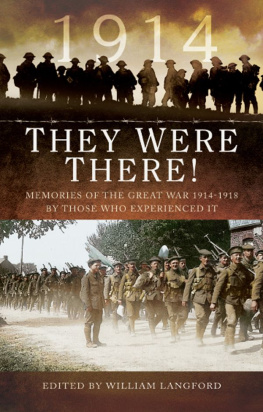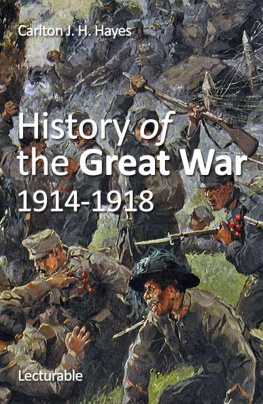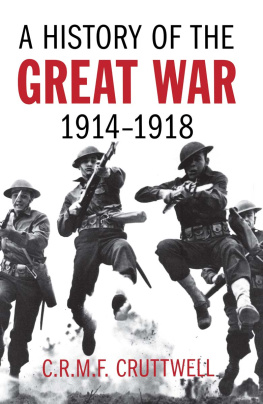

Contents
Dedicated to the memory of my parents,
Cornelia E. and Justin G. Meyer
List of Maps
The War in the West Front endpaper
The War in the East Back endpaper
List of Illustrations
Abbreviations
CNP Colliers New Photographic History of the Worlds War (New York, 1918)CPE Colliers Photographic History of the European War (New York, 1918)GW The Great World War: A History, edited by Frank A. Mumby (Gresham Publishing Company, five volumes 19151917)HW History of the World War by Francis A. March (Philadelphia, 1918)IWM Imperial War MuseumNA National ArchivesNW The Nations at War by Willis John Abbot (New York, 1917)WW Libertys Victorious Conflict: A Photographic History of the World War (Womans Weekly, Chicago, 1918)
A Chronology of the Great War
1914
June 28: | Archduke Franz Ferdinand is assassinated at Sarajevo. |
July 5: | Kaiser Wilhelm II gives blank check to Austria-Hungary. |
July 23: | Austria-Hungary delivers ultimatum to Serbia. |
July 25: | Serbia responds to ultimatum and mobilizes.
Russia declares Period Preparatory to War. |
July 28: | Austria-Hungary declares war on Serbia. |
July 30: | Russia and Austria-Hungary order general mobilization. |
July 31: | Germany issues double ultimatum to France and Russia. |
August 1: | France orders general mobilization.
Germany mobilizes, declares state of war with Russia. |
August 2: | German troops enter Luxembourg. |
August 3: | Germany declares war on France.
Britain orders general mobilization. |
August 4: | Germany declares war on Belgium.
Britain declares war on Germany. |
August 5: | Austria-Hungary declares war on Russia. |
August 6: | Serbia declares war on Germany. |
August 7: | French troops invade Alsace. |
August 10: | France declares war on Austria-Hungary.
Austria-Hungary invades Serbia. |
August 12: | Britain declares war on Austria-Hungary. |
August 16: | Russian troops invade East Prussia. |
August 23: | Germans and British meet in Battle of Mons in Belgium. |
August 26: | Battle of Le Cateau. |
August 28: | Russian Second Army is destroyed at Tannenberg. |
September 311: | Russians force Austro-Hungarians out of Lemberg, drive them back to Carpathian Mountains. |
September 5: | French-British counterattack opens Battle of the Marne. |
September 9: | German withdrawal marks end of Schlieffen Plan offensive. |
September 914: | Germans defeat Russians in Battle of Masurian Lakes. |
October 6: | Belgian troops abandon Antwerp to Germans. |
October 19: | Opening of First Battle of Ypres. |
October 29: | Turkey enters war on side of Austria-Hungary and Germany. |
November 5: | Austria-Hungary invades Serbia. |
December 14: | French and British launch general offensive all along Western Front. |
1915
January 24: | British-German warships meet at Dogger Bank in North Sea. |
February 722: | German victory over Russians in Second Battle of Masurian Lakes. |
March 1013: | Battle of Neuve Chapelle in Frances Artois region. |
March 18: | British-French naval task force fails to force open the Dardanelles. |
April 22: | Second Battle of Ypres begins with German offensive. |
April 25: | British and French forces land on Gallipoli Peninsula. |
May 1: | German offensive at Gorlice and Tarnow in Galicia. |
May 9: | British attack Aubers Ridge; French begin Second Battle of Artois. |
May 23: | Italy declares war on Austria-Hungary. |
June 23: | Italian attack opens First Battle of the Isonzo. |
August 5: | German forces occupy Warsaw, climaxing an offensive that began on July 13. |
August 6: | British forces land at Suvla Bay in Gallipoli. |
September 25: | Massive French offensive begins Second Battle of Champagne and Third Battle of Artois while British attack at Loos. |
October 6: | Germans and Austro-Hungarians invade Serbia. |
October 14: | Bulgaria and Serbia declare war on each other. |
December 17: | Douglas Haig replaces John French as commander of British Expeditionary Force. |
1916
January 8: | British complete evacuation of Gallipoli peninsula. |
February 21: | Germans open offensive at Verdun. |
March 18: | Russians attack German defenders at Lake Naroch. |
May 5: | Beginning of Arab revolt against Ottoman Empire. |
May 31: | The Battle of Jutland in the North Sea. |
June 4: | Russians begin the Brusilov offensive in Austria and Poland. |
July 1: | British and French begin the Battle of the Somme. |
August 27: | Romania declares war on Austria-Hungary. |
August 29: | Hindenburg replaces Falkenhayn as chief of German General Staff. |
September 1: | Bulgaria declares war on Romania. |
September 3: | German-Bulgarian-Turkish force invades Romania. |
October 24: | French launch counteroffensive at Verdun. |
November 23: | Provisional Greek government declares war on Germany and Bulgaria. |
December 5: | David Lloyd George replaces H. H. Asquith as British prime minister. |
December 6: | German troops enter Bucharest, Romania. |
December 12: | Joseph Joffre is replaced by Robert Nivelle as commander of French forces on the Western Front. |
1917
January 31: | Germany announces resumption of unrestricted submarine warfare. |
February 3: | United States ends diplomatic relations with Germany. |
February 23: | Germans begin withdrawal to Hindenburg Line on Western Front. |
March 1: | Contents of Zimmermann telegram are made public. |
Next page
